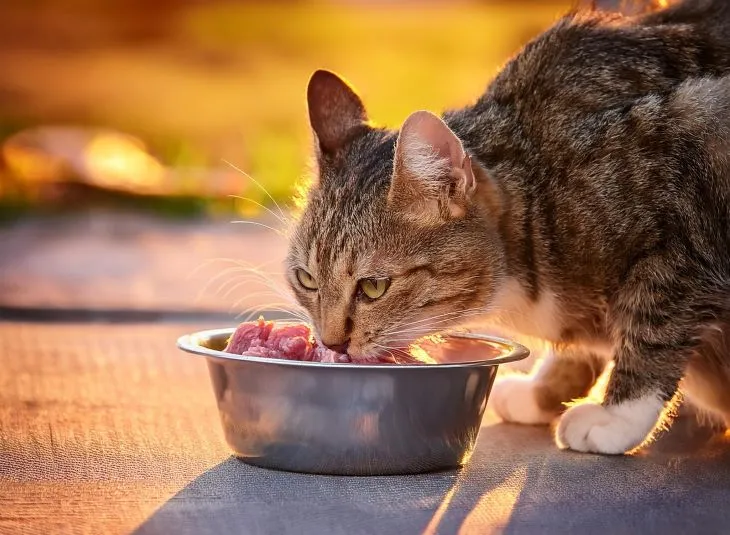Can Cats Eat Raw Meat? Pros, Cons, And Expert Advice
By: Lana Koh

The information in this article is intended to educate cat parents and is not a substitute for veterinary guidance. In case of any concerns about your cat’s health, please talk with your veterinarian.
Feeding your cat raw meat can be a natural and nutrient-packed option, but it’s not without its risks. As obligate carnivores, cats thrive on high-quality, animal-sourced protein. In the wild, they rely on a diet of raw meat, bones, and organs from prey, making raw meat an instinctual choice. However, while raw meat is rich in essential nutrients like protein and moisture that support your cat’s health, it also poses potential dangers.
Uncooked meat, especially beef, can harbor harmful bacteria such as Salmonella and E. coli, as well as parasites, which may lead to serious health concerns. While some cats have strong immune systems capable of handling these pathogens, others—particularly those with underlying health conditions—are at risk of illness. Additionally, raw diets increase the possibility of cross-contamination in the home, affecting not just your pet, but also family members, especially young children and pregnant women.
This doesn’t mean you should eliminate raw meat entirely from your cat’s diet. In fact, in moderation and with high-quality, properly sourced meat, raw feeding can be a beneficial addition. It’s crucial to consult with a veterinarian before making any dietary changes, as they can help guide you on maintaining a balanced diet and ensuring the raw meat you choose is safe and nutritious for your cat.
To fully understand the pros, cons, and proper guidelines for feeding raw meat to cats, continue reading as we explore the benefits, potential risks, and expert tips on incorporating raw meat into your feline’s diet.
The Natural Diet Of Cats
As obligate carnivores, cats are biologically designed to thrive on a diet rich in meat. In the wild, they instinctively hunt small animals like mice, birds, and insects, consuming raw meat, organs, and bones. These natural eating habits provide essential nutrients and are key to their survival.
Ancestral Eating Habits
- Wild cats consume entire prey, from meat to bones
- Raw meat forms a significant part of their diet
- Organs and bones deliver vital nutrients like taurine, calcium, and vitamins
Given these instincts, many pet owners wonder whether feeding raw meat to domestic cats is beneficial or safe. So, is raw meat a good option for your feline companion? Let’s explore this further.
Pros Of Feeding Raw Meat To Cats
Many cat owners believe that raw meat provides several benefits for their pets. Here are some reasons why:
1. Improved Digestibility
Raw meat is often easier for cats to digest than processed foods. It contains natural enzymes that aid digestion and help cats absorb essential nutrients more efficiently.
2. Dental Health
Chewing raw meat and bones can naturally clean a cat’s teeth, helping to reduce plaque buildup and lower the risk of dental issues.
3. Shiny Coat And Healthy Skin
The high levels of protein and healthy fats in raw meat can contribute to a glossy coat and improved skin health for your cat.
4. Weight Management
Raw diets are typically low in carbohydrates and rich in proteins, helping to maintain a healthy weight by reducing the risk of obesity.
5. Increased Energy Levels
Many cat owners report that their cats seem more energetic and playful when fed a raw meat diet, likely due to the natural nutrients and balanced energy from the meat.
Cons Of Feeding Raw Meat To Cats
While there are potential benefits, feeding raw meat to cats also comes with risks that should be carefully considered:
1. Bacterial Contamination
Raw meat can carry harmful bacteria, leading to illness in both cats and humans. Strict hygiene is necessary to avoid contamination.
2. Parasites
Uncooked meat may contain parasites like Toxoplasma gondii, posing health risks to cats and humans, particularly those with compromised immune systems.
3. Nutritional Imbalances
Crafting a balanced raw diet for cats is challenging. Cats may miss out on essential nutrients without proper expertise, leading to deficiencies.
4. Choking Hazards
Bones in raw meat can splinter and pose choking risks or cause internal injuries.
5. Food Safety Concerns
Handling and storing raw meat demands strict food safety measures to prevent contamination, spoilage, and cross-contamination in your home.
Guidelines For Feeding Raw Meat To Cats
If you’re considering giving your cat raw meat, follow these steps to ensure it’s done safely:
1. Consult With A Veterinarian
Always get advice from your vet before making major changes to your cat’s diet.
2. Choose High-Quality Meat
Opt for fresh, human-grade meat from trusted suppliers to reduce health risks.
3. Practice Proper Food Safety
Handle raw meat with care to prevent cross-contamination and bacteria spread.
4. Freeze Meat Before Feeding
Freezing meat for at least 24 hours can kill certain parasites.
5. Introduce Raw Meat Gradually
Transition your cat slowly to raw meat to avoid digestive issues.
6. Balance the Diet
Ensure your cat gets all essential nutrients by following a well-planned raw diet.
7. Monitor Your Cat’s Health
Keep an eye on your cat’s behavior, weight, and overall health after introducing raw meat.
Related article: Warning signs that your cat is crying for help
Alternatives To Raw Meat For Cats
If you’re hesitant to feed your cat raw meat, there are several nutritious alternatives that can provide a high-quality diet:
1. Commercial Raw Food Diets
Many reputable pet food brands offer frozen or freeze-dried raw diets specifically formulated to meet your cat’s nutritional requirements while reducing safety concerns.
2. Gently Cooked Diets
Cooking meat lightly can eliminate harmful bacteria while preserving much of its nutritional value, making it a safe option for your feline friend.
3. High-Quality Commercial Cat Foods
Premium wet and dry cat foods are designed to provide essential nutrients that support your cat’s growth and overall health.
Conclusion
In summary, while cats can safely consume raw meat, the decision is not straightforward. Raw meat diets present potential benefits, such as improved digestibility and enhanced dental health, but they also pose significant risks, including bacterial contamination and nutritional imbalances. If you’re contemplating a raw meat diet for your feline companion, it’s essential to conduct thorough research, consult with a veterinarian, and implement proper safety measures. By doing so, you can help ensure that your cat’s nutritional needs are met while minimizing health risks. Prioritizing your pet’s well-being will lead to a healthier, happier life.
Frequently Asked Questions

About the Author
Lana Koh
Lana is a passionate cat lover with years of experience caring for her feline companions. As a dedicated volunteer at animal shelters, she’s gained valuable insights into the world of cats. Lana channels her love and knowledge into writing informative and engaging articles for fellow pet owners, covering topics like cat health, nutrition, grooming, behavior, and the special bond we share with our feline friends.
